 Dear Brothers and Sisters in Christ,
Dear Brothers and Sisters in Christ,
The Gospel this weekend begins a several-week continuation of the Gospel of John, chapter 6. This powerful chapter is often called the Bread of Life discourse. I recommend taking some time each week to read through the entire chapter and so allow our Lord’s words to really take root in your heart. We begin with the famous story of the feeding of the 5,000. A vast crowd has followed Jesus. We heard last weekend of how the heart of our Lord is moved with pity for those who are seeking Him, and this story is no different. Moved with that same pity, Jesus teaches the Apostles how to feed those who seek the Lord. Concerned by the great number before them, the Apostles recognize that a great amount of money would be required for even a single bite of food to be given to each person. Nevertheless, Andrew points out a boy who has five barley loaves and two fish. You know the story: Jesus blesses the food and gives it to the Apostles to distribute. Not only does everyone eat their fill, but twelve baskets of what is left over are collected.
And so the Bread of Life discourse begins with a show of the power that Jesus has to feed those who follow Him. It is not His power only, though. On display also is our Lord’s burning desire to feed His people and to involve the disciples in the act of feeding. “Where can we buy enough food?” In the immediate sense, Jesus wants the disciples to be personally involved in the feeding of the great crowd. But the entire sixth chapter of John’s Gospel is pointing us to a far greater purpose that Jesus undertakes: to feed His people not only physically but spiritually. At the Last Supper and in the Eucharist, Jesus will feed us, not with food that satisfies physical hunger but with the supernatural food that nourishes the spiritual life. In other words, the human heart, regardless of the circumstances in which one lives, hungers for real, solid, spiritual food, the kind of food that only Jesus can provide. But when He asks, “Where can we buy enough food?” the task of providing for this physical and spiritual hunger becomes a shared task. Jesus wills to share his ability with the Apostles. Throughout His public ministry, Jesus teaches the Apostles what service to the poor and outcast looks like, and at the Last Supper, gives them the command to celebrate the Eucharist. With that command, it becomes clear that the disciples of Jesus are to spend their lives answering the question “Where can we buy enough food?” and feeding people both physically (in works of charity) and spiritually (in the sacraments and the life of prayer).
Every Mass is a moment for us to receive this food that Jesus gives. In the Eucharist, we receive the Bread of Life, and with it, the spiritual nourishment we need to live out the Gospel in its fullness. While the Eucharist may not provide much sustenance in relief of physical hunger, in the Body and Blood of Jesus, we find, in fact, all that we need to sustain our souls. In the midst of this Year of St. Joseph, we have been invited to reflect on the silence of St. Joseph, on his obedience, and on his profound fatherly care. As the Year of the Eucharist overlaps with the Year of St. Joseph, I think we can find important parallels for meditation. One of the most powerful spiritual tools for prayer, especially when we are in the presence of Jesus in the Eucharist, is silence. In these weeks reflecting on John 6, we have an opportunity to join St. Joseph in prayer. To imitate the silence of St. Joseph and learn from him how to quiet our hearts as we behold his Son. To learn obedience to the Church’s liturgical practice and open our hearts to understand how the Mass draws us in to deeper communion with our fellow parishioners and with the Church throughout the world. To see in the Eucharist the most vibrant example of the Father’s love for us – that He gives His own Son for our salvation, and that St. Joseph is the instrument the Father uses to teach the Son obedience, virtue, and self-gift.
For the next few weeks, let us place ourselves in and among those 5,000 whom Jesus fed. Let us each week be aware of our hunger for God and of His desire to feed us and provide for our needs. What was it like for those who heard Jesus speak? How did they receive His words? We have an opportunity in this prolonged meditation and prayer to unite ourselves more completely to Him, to receive His words, to be fed by His grace. May our reflection on the Bread of Life discourse draw us in deeper communion and knowledge of the truth of the Eucharistic presence of Jesus.
Peace,

Fr. Sam


